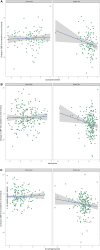Metabolomic Profiles Associated With Blood Pressure Reduction in Response to the DASH and DASH-Sodium Dietary Interventions
- PMID: 37161796
- PMCID: PMC10262995
- DOI: 10.1161/HYPERTENSIONAHA.123.20901
Metabolomic Profiles Associated With Blood Pressure Reduction in Response to the DASH and DASH-Sodium Dietary Interventions
Abstract
Background: The DASH (Dietary Approaches to Stop Hypertension) diets reduced blood pressure (BP) in the DASH and DASH-Sodium trials, but the underlying mechanisms are unclear. We identified metabolites associated with systolic BP or diastolic BP (DBP) changes induced by dietary interventions (DASH versus control arms) in 2 randomized controlled feeding studies-the DASH and DASH-Sodium trials.
Methods: Metabolomic profiling was conducted in serum and urine samples collected at the end of diet interventions: DASH (n=219) and DASH-Sodium (n=395). Using multivariable linear regression models, associations were examined between metabolites and change in systolic BP and DBP. Tested for interactions between diet interventions and metabolites were the following comparisons: (1) DASH versus control diets in the DASH trial (serum), (2) DASH high-sodium versus control high-sodium diets in the DASH-Sodium trial (urine), and (3) DASH low-sodium versus control high-sodium diets in the DASH-Sodium trial (urine).
Results: Sixty-five significant interactions were identified (DASH trial [serum], 12; DASH high sodium [urine], 35; DASH low sodium [urine], 18) between metabolites and systolic BP or DBP. In the DASH trial, serum tryptophan betaine was associated with reductions in DBP in participants consuming the DASH diets but not control diets (P interaction, 0.023). In the DASH-Sodium trial, urine levels of N-methylglutamate and proline derivatives (eg, stachydrine, 3-hydroxystachydrine, N-methylproline, and N-methylhydroxyproline) were associated with reductions in systolic BP or DBP in participants consuming the DASH diets but not control diets (P interaction, <0.05 for all tests).
Conclusions: We identified metabolites that were associated with BP lowering in response to dietary interventions.
Registration: URL: https://www.
Clinicaltrials: gov/ct2/show/NCT03403166; Unique identifier: NCT03403166 (DASH trial). URL: https://www.
Clinicaltrials: gov/ct2/show/NCT00000608; Unique identifier: NCT00000608 (DASH-Sodium trial).
Keywords: blood pressure; dietary approaches to stop hypertension; hypertension; metabolic networks and pathways; metabolomics.
Conflict of interest statement
Figures




References
-
- Lichtenstein AH, Appel LJ, Vadiveloo M, Hu FB, Kris-Etherton PM, Rebholz CM, Sacks FM, Thorndike AN, Van Horn L, Wylie-Rosett J. 2021 dietary guidance to improve cardiovascular health: a scientific statement from the American Heart Association. Circulation. 2021;144:e472–e487. doi: 10.1161/CIR.0000000000001031 - PubMed
-
- US Department of Agriculture, US Department of Health and Human Services, Health and Human Services. Dietary Guidelines for Americans, 2020-2025 [Internet]. US Government Printing Office; 2020. https://www.dietaryguidelines.gov/
-
- Appel LJ, Moore TJ, Obarzanek E, Vollmer WM, Svetkey LP, Sacks FM, Bray GA, Vogt TM, Cutler JA, Windhauser MM, et al. . A clinical trial of the effects of dietary patterns on blood pressure. N Engl J Med. 1997;336:1117–1124. doi: 10.1056/nejm199704173361601 - PubMed
-
- Sacks FM, Svetkey LP, Vollmer WM, Appel LJ, Bray GA, Harsha D, Obarzanek E, Conlin PR, Miller ER, Simons-Morton DG, et al. ; DASH-Sodium Collaborative Research Group. Effects on blood pressure of reduced dietary sodium and the Dietary Approaches to Stop Hypertension (DASH) diet. N Engl J Med. 2001;344:3–10. doi: 10.1056/NEJM200101043440101 - PubMed
Publication types
MeSH terms
Substances
Associated data
Grants and funding
LinkOut - more resources
Full Text Sources
Medical

